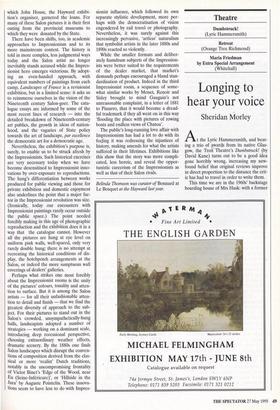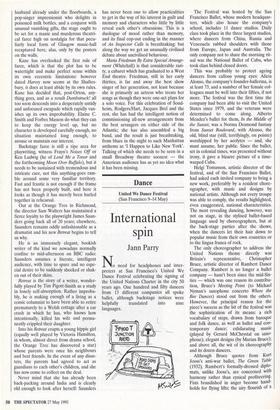Theatre
Dumbstruck!
(Lyric Hammersmith) Retreat (Orange Tree Richmond) Maria Friedman by Extra Special Arrangement (Whitehall)
Longing to hear your voice
Sheridan Morley At the Lyric Hammersmith, and bear- ing a trio of awards from its native Glas- gow, the Troll Theatre's Dumbstruck! (by David Kane) turns out to be a good idea gone horribly wrong, increasing my new- found belief that original reviews improve in direct proportion to the distance the crit- ic has had to travel in order to write them.
This time we are in the 1960s' backstage boarding house of Mrs Husk: with a former husband already under the floorboards, a pop-singer impressionist who delights in poisoned milk bottles, and a conjuror with unusual vanishing gifts, the stage ought to be set for a manic and murderous theatri- cal farce high on nostalgia for that pecu- liarly local form of Glasgow music-hall recaptured here, alas, only by the posters on the walls.
Kane has overlooked the first rule of farce, which is that the plot has to be watertight and make perfect sense within its own eccentric limitations: however dated Harvey now seems at the Shaftes- bury, it does at least abide by its own rules. Kane has decided that, post-Orton, any- thing goes, and as a result Dumbstruck! all too soon descends into a desperately untidy and unfocused escapade which rapidly van- ishes up its own improbability. Elaine C. Smith and Forbes Masson do what they can to keep the energy level up, but no character is developed carefully enough, no situation maintained long enough, to arouse or maintain our interest.
Backstage farce is still a ripe area for playwriting, witness Frayn's Noises Off or Ken Ludwig (he of Lend Me a Tenor and the forthcoming Moon Over Buffalo), but it needs to be sustained with tremendous and intricate care, not this anything-goes ram- ble around some very familiar territory. Fast and frantic is not enough if the frame has not been properly built, and here it looks as though it has merely been hurled together in rehearsal.
Out at the Orange Tree in Richmond, the director Sam Walters has maintained a fierce loyalty to the playwright James Saun- ders going back all of 20 years; elsewhere, Saunders remains oddly unfashionable as a dramatist and his new Retreat begins to tell us why.
He is an immensely elegant, bookish writer of the kind we nowadays normally confine to mid-afternoon on BBC radio: Saunders assumes a literate, intelligent audience, with time to spare and no espe- cial desire to be suddenly shocked or shak- en out of their skins.
Retreat is the story of a writer, wonder- fully played by Tim Pigott-Smith as a study in lonely self-absorption. Rather improba- bly, he is making enough of a living as a comic columnist to have been able to retire prematurely to a Welsh cottage after a car crash in which he has, who knows how intentionally, killed his wife and perma- nently crippled their daughter.
Into his Retreat erupts a young hippie girl (equally well played by Victoria Hamilton, in whom, almost direct from drama school, the Orange Tree has discovered a star) whose parents were once his neighbours and best friends. In the event of any disas- ters, the parents had agreed to act as guardians to each other's children, and she has now come to collect on the deal.
Never mind that she has already been back-packing around India and is clearly old enough to look after herself: Saunders has never been one to allow practicalities to get in the way of his interest in guilt and memory and characters who little by little reveal each other's obsessions. This is a duologue of mood rather than memory, and its final cop-out ending in the manner of An Inspector Calls is breathtaking: but along the way we get an unusually civilised debate about uncivilised behaviour.
Maria Friedman By Extra Special Arrange- ment (Whitehall) is that considerable rari- ty, a cabaret which has graduated to a West End theatre. Friedman, still in her early thirties, is far and away the best show singer of her generation, not least because she is primarily an actress who treats her songs as though they were one-act plays for a solo voice. For this celebration of Sond- heim, Rodgers/Hart, Jacques Brel and the rest, she has had the intelligent notion of commissioning all-new arrangements from the best arrangers on either side of the Atlantic; she has also assembled a big band, and the result is just breathtaking, from blues in the night to such Manhattan anthems as 'I Happen to Like New York'. Talking of which she needs to be seen in a small Broadway theatre soonest — the American audience has as yet no idea what it has been missing.



































































 Previous page
Previous page